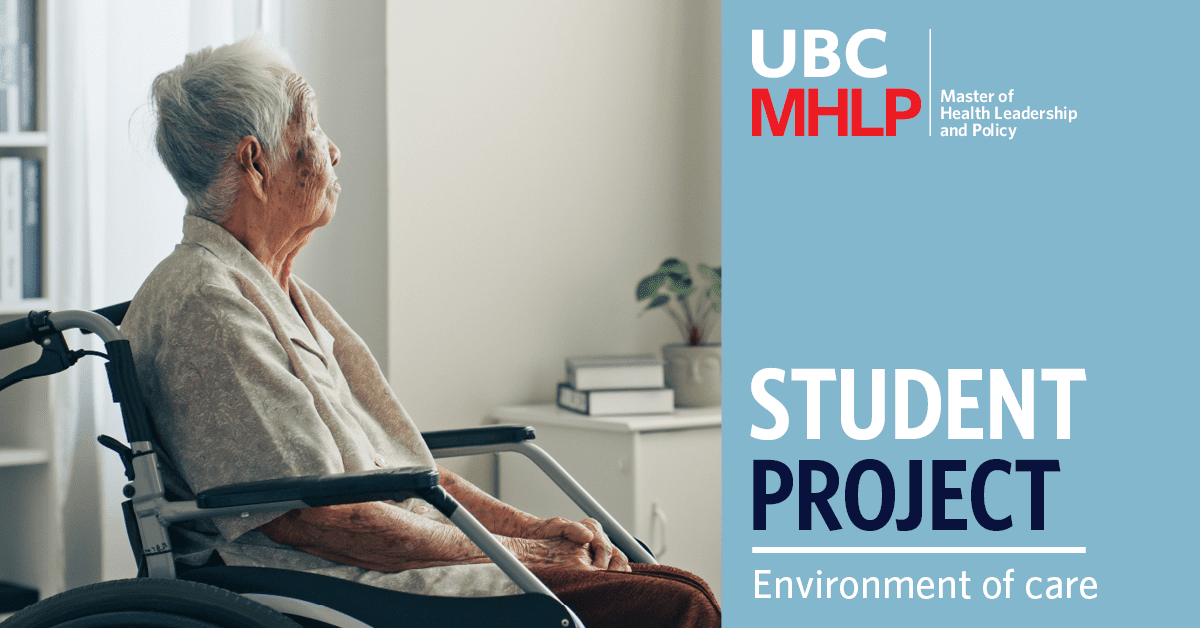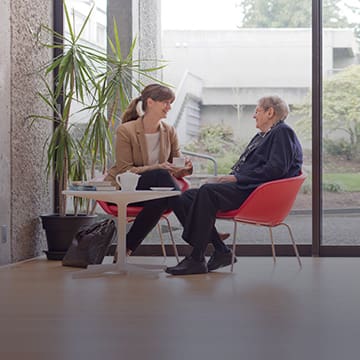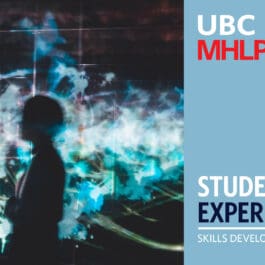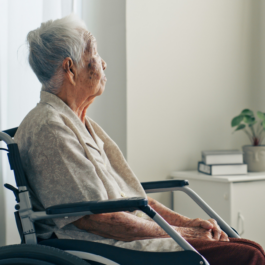
Student Experience – Veronica Lewis

As part of a course project in the Master of Health Leadership and Policy in Seniors Care, Veronica Lewis reviewed the physical and social environments at Opal by Element, a seniors’ residence in Vancouver where she has worked since 2021.
Opal provides a continuum of care for 160 residents— from independent living to assisted living and complex care – built around the philosophy of aging in place.
I chose to do my project on Opal because it is the place where I work, but also because we are building a new facility in Victoria and I wanted to be able to influence some of the design choices earlier on in the process when it is easier to implement them compared to after the building is complete.
A physically and socially welcoming community
Veronica says that Opal’s Vancouver residence was built nearly five years ago and incorporates many best practices that support healthy living for older people, including an open design, non-institutional look, natural lighting, accessible outdoor spaces and single-occupancy rooms.
Similarly, the facility also provides strong social supports for its residents. At the top of the list is its focus on intergenerational living, with rental suites and condos available to anyone 55 years and older, enabling extended family members to live at Opal, with some in the independent suites and others in the suites for those requiring complex care.
Opal only requires that one family member in a suite be 55 years or older, thereby allowing family members from different generations to live together. Family rooms also provide a welcoming space for grandchildren and grandparents to interact and play. Daily activities and events also create important opportunities for seniors to stay active within the community.
Recommendations for improvement
Veronica made three recommendations to improve the physical environment, focusing on changes to the complex care unit.
Including salient visuals and wayfinding strategies – such as memory boxes or other ways for people to easily recognize their room – would greatly assist the more than 50 per cent of our residents on the complex care unit who are living with dementia.
Veronica also suggested that rooms should continue to be equipped with a hospital bed, but that Opal should allow incoming residents to bring in their own furniture. “This would make the rooms more personal and homey, and research supports that this can have a beneficial impact on well-being.”
Her final recommendation on the physical side was to modify the spa room to make it more inviting.
Replacing the existing tub with a walk in bath would make a world of difference and transform this into a better-used space. With the current set-up, our residents must use a lift if they want to use the tub, even if they are quite capable of entering and exiting independently.
On the social side, Veronica notes that while a majority of residents speak Cantonese or Mandarin, there are limited numbers of multilingual staff, which makes it harder to establish meaningful relationships and could impact care delivery. Her recommendation to prioritize hiring staff who can speak those languages has already been implemented, with a Cantonese-speaking physician and other frontline staff hired into a care position after Veronica submitted her report.
Veronica also recommended that all staff be offered advanced dementia care training given that half the residents in the community has a cognitive impairment; her final recommendation was to create more inclusive opportunities for residents to share their perspectives.
Recommendations lead to results
Veronica shared the results of her research and recommendations for improvement with other Opal staff in late 2023. “The team here at Opal has been very responsive to the proposals and want to grow and improve to make the current site better,” she says.
As noted, Opal is taking steps to hire more multilingual care staff and the design team for the new Victoria residence will consider Veronica’s ideas to optimize the physical environment in support of residents’ health and well-being.
MHLP in Seniors Care accelerates career advancement
Veronica has worked in seniors care for more than 15 years, starting as a personal support worker and later as a registered practical nurse and registered nurse. After moving to BC in 2021, she began working as a team lead at Opal.
In January 2022 she began the MHLP in Seniors Care as a part-time student while continuing to work full time at Opal. Over the course of her degree, she was appointed as care manager and, in January 2024, she was promoted to director of care.
I believe that this master’s degree has helped me advance into a leadership position faster than I would have otherwise.
“Although I had 15 years of experience in the industry, I did not have specific training in business and leadership. The MHLP gave me that exposure and prepared me to be a successful leader. It was also an outstanding opportunity to learn from other MHLP students – we all had very different professional backgrounds and you are able to learn so much from this group of diverse peers,” says Veronica.
Veronica is thrilled to now be in a role where she can oversee a team to provide a high level of care for residents.
I now have a bigger voice for a population that is often underappreciated and undervalued.
Seniors Care
Move your career forward as a health-care specialist dedicated to improving patient outcomes and fostering the well-being of seniors.
Read MoreApplication Deadlines
The online application portal for the January 2025 has closed.
Get ready to apply!
Admissions for the 2026 intake will open on January 1, 2025.
How to Apply


